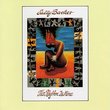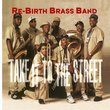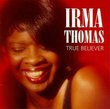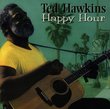| All Artists: Robert Nighthawk Title: Live On Maxwell Street 1964 Members Wishing: 3 Total Copies: 0 Label: Rounder Select Release Date: 2/14/1992 Album Type: Live Genres: Blues, Pop Styles: Chicago Blues, Traditional Blues, Electric Blues, Slide Guitar Number of Discs: 1 SwapaCD Credits: 1 UPCs: 011661202221, 011661202214, 011661202245 |
Search - Robert Nighthawk :: Live On Maxwell Street 1964
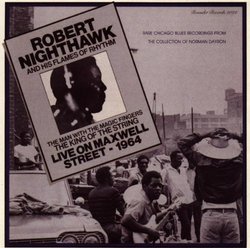 | Robert Nighthawk Live On Maxwell Street 1964 Genres: Blues, Pop
Seldom has a title for any album been so literal: Live on Maxwell Street was recorded, for the most part, live on an actual street--background noise includes cheers from bystanders, people passing by, and cars driving past... more » |
Larger Image |
CD DetailsSynopsis
Amazon.com Seldom has a title for any album been so literal: Live on Maxwell Street was recorded, for the most part, live on an actual street--background noise includes cheers from bystanders, people passing by, and cars driving past. The informal setting and necessarily unideal recording circumstances don't detract one bit from the material here, which represents some of the elusive Robert Nighthawk's best material. Recorded in 1964, with sparse instrumentation--rhythm guitar, drums, and some excellent harmonica from Carey Bell--the recording includes some great guitar soloing on "The Time Have Come" and the "Maxwell Street Medley," which combines "Anna Lee" and "Sweet Black Angel." Other highlights include the smooth, active "Take It Easy Baby" and the slow moaner "I Need Love So Bad." Despite the highly unofficial nature of this recording, what's on here is more than worth hearing--including a 13-minute interview with the musician. --Genevieve Williams Similar CDs
|
CD ReviewsGreat music with a sad history C. Talcroft | Santa Rosa, CA | 08/05/1998 (5 out of 5 stars) "This disc contains extraordinary music. It contains the first known recordings of Carey Bell (who was about 28 in 1964). It contains one of the very few glimpses we have of Robert Nighthawk in an informal setting. Highlights include Nighthawk's growling guitar work on "Goin' Down To Eli's;" some of the most extraordinary electric blues guitar playing ever recorded on "I Need Love So Bad;" Nighthawk doing the two songs that brought him his first real fame--"Annie Lee" and "Sweet Black Angel" (here listed as "Maxwell Street Medley"); and a lively rendition of "Take It Easy Baby." Not to be overlooked, however is fine harp work by Carey Bell doing "Juke" (here erroneounsly entitled "Mr. Bell's Shuffle"). In short, this music captures the excitement of raw, live blues on Chicago's Maxwell Street in its heyday. Sadly, it is not widely known that the material presented on this disc was bootlegged ! by Mr. Dayron, who did his recording while working for Mike Shea while Shea was making his now-legendary Maxwell Street documentary "And This Is Free." Fortunately, an official two-CD release of all of the "And This Is Free" material is in the works. The discs will include this music and much more, and they will tell the true story of the making of "And This Is Free." They will also include some of the wealth of band chatter, crowd sounds, and ambience of Maxwell Street that was captured on the original tapes (but cut out of the release reviewed here) back when the likes of Nighthawk, Carey Bell, Johnny Young, and Big John Wrencher could be heard live for a dime in a hat--literally." The original unauthorized version.... C. Talcroft | Santa Rosa, CA | 03/18/2001 (1 out of 5 stars) "This is the original CD version of the first unauthorized release of this music. Rounder--with unbelievable audacity--has just reissued this disc with bonus tracks that sound to this writer like they were lifted from Rooster's recent 3-CD release "And This Is Maxwell Street," which was the first and only authorized release of this music--and much, much more. My advice to anyone interested in Robert Nighthawk and in hearing the raw, unedited, electric blues of Chicago played by some of the masters that molded the style is to forget this and go get "And This Is Maxwell Street." "And This Is Maxwell Street" includes all the music on this disk but mastered from the original tapes made for Mike Shea's documentary film "And This Is Free," the original source of these recordnigs, plus all the band chatter and street ambience that was edited out of the compilation reviewed here. The new Rooster release also includes tracks by Johnny Young, Big John Wrencher, Carey Bell, James Brewer's gospel group, Arvella Grey, and Michael Bloomfield. The full Bloomfield interview of Robert Nighthawk (44 minutes!) appears on that three-CD deluxe set, which also has a 60-page booklet lavishly illustrated with new, rare photos, and includes a full explanation of how these recordings came to be. I personally see no need to bother with the CD reviewed here at all when the far superior "And This Is Maxwell Street" is available. It is no surprise that "And This Is Maxwell Street" was nominated for a W.C. Handy award. It is no surprise that it has won three Living Blues Awards--best historical blues recording in the critics poll, best historical blues recording in the readers poll, and best liner notes of ANY blues recording in its year of release." Gritty, honest and raw T. K. Schonhoff | Seattle, WA USA | 08/11/2000 (5 out of 5 stars) "This kind of blues is like the record of a lost civilization - gone so long that we've almost forgotten how much it accomplished in its prime. In the 36 years since this album was recorded, electric-guitar blues has been buffed and polished to a high shine but we've lost too much in the process. The rough edges that got sanded away took with them the very texture of the blues - leaving the listener with nothing to hold on to.If that strikes a chord with you, grab this CD - and let it grab you right back. It's rough, raw and gritty - a musical snapshot of the streets on which it was recorded. As I listen to it again and again, I find myself listening *through* it, hoping to to catch the sounds of the city and the very moment in which it was recorded. This is the blues stained with sweat, nicotine and cheap beer on a hot summer afternoon - and it's intoxicating."
|

 Track Listings (10) - Disc #1
Track Listings (10) - Disc #1